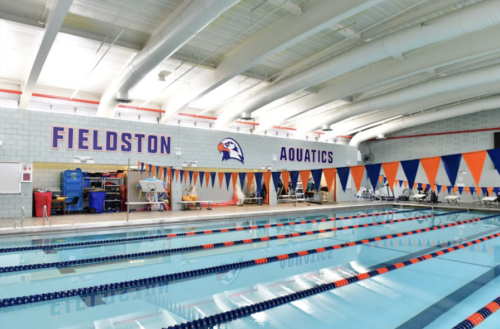We watch sports games and witness their outcomes, but do we ever stop to think about what happens behind the scenes before the season starts? Fieldston has many sports that take place throughout the year such as tennis, field hockey, soccer and football. During the winter, swimming, basketball, table tennis, ice hockey and indoor track take place. Here is a glance at what the athletes and coaches go through to perform well.
Form IV athlete Sarah Weinick explained what her preseason training for varsity basketball consists of: “a lot of conditioning to prepare for the season. We also focus on a lot of team-based drills, like layups. We also do team-bonding drills such as running the stairs in the athletic building. Basically a lot of running.” The physical conditioning and drills that the female basketball athletes do in the winter preseason allows them to properly prepare for the season, and demonstrate their stamina and athletic abilities. Layla Finn, a year-round Form IV track athlete, described her winter-preseason workouts: “It’s indoor track, but we run outside. It’s cold, but we do some sort of running workout, whether that’s long-distance, or speed-work. After about an hour/hour-and-a-half of that, we do an ab workout or we lift weights.” Such rigorous training can benefit athletes physically and mentally.
When asked about the mental aspect of the sport, Weinick explained what goes through her mind. “Am I doing the right thing? Basketball is a competitive sport, you’re playing girls from all over the city and you get bounced around a lot.” Weinick plays against many competitive players that challenge her mentally. The challenge only improves her game, as challenges cause physical and mental growth. When asked about the physical and mental aspects of the game Finn responded, “It’s challenging both ways. Physically, it’s a lot of hard work at high intensity. Especially if you’re not used to high-intensity running every day, it’s really challenging. Mentally, also, you’re doing so much running and working out, it’s hard to go back the next day and do it again and put your body through that again.”
To perform well during basketball season, Weinick prepares year-round. “I practice three to five days a week in the offseason, and I play other sports at Fieldston. This in some way helps me prepare for basketball.” Weinick focuses on the intensity of basketball during the winter season at school, as it’s a rigorous five-day-a-week program. When asked about the overall dynamic and competitiveness of the team, Weinick remarked, “It’s really competitive. As a team, we’re really focused on one goal, and that’s becoming a team-bond and winning. We had a successful season last year and we’re looking to build on that this year.” This team focus allows her and her teammates to bond and prepare for success.
I checked in with Coach Danielle Gabriel, also known as “Coach D,” for a different perspective. She shared her experience with the 2024 winter preseason and season. Gabriel coaches table tennis and has been for several years. Gabriel described table tennis as a more unique sport; “Table tennis in general is a little different because it’s non-traditional. We only practice three days a week; Monday, Wednesday [and] Friday.” Gabriel also explained that table tennis is not in the Ivy League, as not all schools play. Gabriel dived into what the practices look like. “We do a lot of game-like situations within our practice. So a lot of time we have our kids face each other in mini-matches, with doubles and singles. We also kind of talk about things we’re going to see from other teams, and how to capitalize on our opponents’ errors. We also try to identify our own strengths and capitalize on those as well.” Gabriel’s table tennis team focuses on strategy, and how to make the most out of their opponents’ strengths and weaknesses as well as their own.
As a Fieldston athlete, I can attest to the fact that you have to dedicate yourself and contribute to your team wherever in order to succeed. Finn had a similar observation when asked about the audience’s recognition of the time practicing to perform well in a sport. “I think it’s easier for them to think about it if they do a similar sport as well. A lot of people think of track as just running, but so much more goes into that, and people need to recognize that. Everyone at track meets has built up to where they are.” Gabriel agreed with Finn when she explained, “I think it has definitely grown over the years, as table tennis has grown in the years. It is a non-traditional sport, so it definitely does not have the same support as say basketball, but the success of the sport has allowed the students to see that athletes are putting in the hard work and it really is a competitive sport.” Gabriel notes that appreciation and recognition of the time and effort spent on table tennis has grown over the years. Listening to what our athletes and coaches have to say, it is evident that we need not just watch athletes’ performances but appreciate the practice, time and effort put into the high level of performance.






